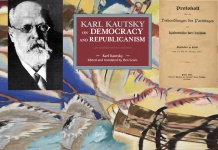
On a night out drinking and suffering from the resulting inebriated disposition, Karl Marx and his friends Edgar Bauer and Wilhelm Liebkneckt started smashing up a number of street lanterns using a pile of paving stones. Bauer in his drunken state had, prior to this act of wanton hooliganism, tripped over them. They were then pursued by police officers, with Marx’s friends quite surprised by his agility. Marx’s evenings out on the town indulging in intoxication were and are not the most important impact that friendship has had upon his life or his political ideas.
This is without question the relationship he forged with Frederick Engels, the comrade who became his lifelong collaborator. The depth of this friendship was such that it sits at the centre of arguments about the origins of and ongoing misreading and misinterpretations of the marxist political tradition. Their friendship was more just a biographical note or anecdote, explaining how either of them came to occupy their free time when they were not agitating for the overthrow of the existing order of things. The importance of this friendship to the friends involved is also a prism for contemporary debates about the political differences between the two. The boundaries of their friendship sits quietly in the background of some explanations around how and why marxists failed to lead those revolutions of the twentieth century into a new global order of equality and freedom. Did Engels interpretation of Marx inform the mechanical marxism of Stalin? How much of the 2nd and 3rd volumes of Capital, edited from Marx’s notes by Engels, also bear his ideas? Here, and on these terms, the personal is very much the political.
Revolutionaries today have a tendency to repeat the mistake of unconsciously entangling the political and personal. Political and personal relationship are seem as either inseparable or irrelevant. When a comrade voices an idea with disagree with, well, perhaps it’s that friendship they have, how “close” they are to someone who has always been a bit shifty? Or, once we hear of that new person who inspires love and passion in that comrade’s life, we assume they must be in a sorry state of mind. Maybe they’ve always been too embroiled with the ne’er-do-wells and oddballs so often drawn to the politics of an alternative? Or, when our respect cannot be dented for someone we defend their personal habits as if it were of little consequence. Maybe that comrade is a sleaze, but they’ve never been abusive so what they do in their personal life is not up to us to dictate. Yes, they’ve a tendency to be abrasive or rude to even their closest friends but they’re sincere and serious about politics.
In the German Ideology, Marx sketches out how community effects the experience of a personal life:
The transformation, through the division of labour, of personal powers (relationships) into material powers, cannot be dispelled by dismissing the general idea of it from one’s mind, but can only be abolished by the individuals again subjecting these material powers to themselves and abolishing the division of labour. This is not possible without the community. Only in community [with others has each] individual the means of cultivating his gifts in all directions; only in the community, therefore, is personal freedom possible. In the previous substitutes for the community, in the State, etc. personal freedom has existed only for the individuals who developed within the relationships of the ruling class, and only insofar as they were individuals of this class. The illusory community, in which individuals have up till now combined, always took on an independent existence in relation to them, and was at the same time, since it was the combination of one class over against another, not only a completely illusory community, but a new fetter as well. In a real community the individuals obtain their freedom in and through their association.
(Marx, 1845)
Finding oneself in a community is a fine balance between an accident of history and a chosen path. The accident of belonging to a class by birth seems to contradict the notion that it is through the movements of this same class that we will find freedom of personal development. Marx saw in our communities, our class, the place where the struggle for a “right to the undisturbed enjoyment” of “personal freedom” could be successful. It is through a way of life in which the freely chosen path of each individual becomes the character of the shared community into which we are born that ensures a society in which all are truly equal. And it is only through a society in which equality is our permanent shared state that we can realise ourselves in freedom of assembly and destiny. Equality creates the conditions for each individual to give of their apparently natural or learned talents, whilst receiving from us all anything they would need to thrive both emotionally and physiologically.
Comradeship, in fact friendship, is not an island of socialism, but it is an oasis of choice. A place where we can find solace from the desert heat of a society where the ruling class expect us to be clawing each other’s eyes out for the few drops of nourishment that spill from their overflowing tables. Finding comrades who fight with us, not to just lay down in the sand and give up, but drag us to our feet and force us to march on makes the difference in the lives of revolutionaries. When Engels gifted to Marx both of his time and money he did so because he believed in his comrade’s, his friend’s, capacity to change the world. He saw how the impoverishment, illness and financial difficulties of everyday life hampered this.
This is not simply a sentiment, an apolitical loyalty based in a history of boozing and knocking over lanterns, this is also a display of passion. It is a commitment to the idea that success is not just aimed towards personal pleasure, but that it is also the pleasure of seeing another person succeed. Solidarity is not rooted solely in a sense of victory for one’s side over another, but is also the feeling of seeing someone else’s victory as one’s own. In this sense, feelings, passions, are political moments inspiring and challenging us:
Politics becomes permanent action and gives birth to permanent organisations precisely in so far as it identifies itself with economics. But it is also distinct from it, which is why one may speak separately of economics and politics, and speak of “political passion” as of an immediate impulse to action which is born on the “permanent and organic” terrain of economic life but which transcends it, bringing into play emotions and aspirations in whose incandescent atmosphere even calculations involving the individual human life obey different laws from those of individual profit.
(Gramsci, 140)
Our political lives are lives of passion, and love. The value of friendship is a testament to the importance of community, of these bonds of solidarity that become in themselves important political motivations. The impulse towards struggle is not just the result of quantified equations of economic variables, but a reflection and result of the personal risks and rewards that the insurgent working class weighs up when it decides to take action. When we fight we do it for something, and most often this something is a someone or someones. The meaning of the word socialism should always be remembered as being rooted in the idea of being social in the fullest sense. An embracing of Marx’s favourite motto: “nothing human is alien to me”.
In our own political lives, being imperfectly human, prone to mistakes and slips of the tongue, errors of judgement and false apprehensions is neither unpunishable nor inexcusable. This is because the meaning of being a revolutionary today, probably much as it always has been, is to release human potential from the chains of a society in which the impoverished majority are forced to live by a wealthy minority’s rulebook. We will err in this process and it is our collective responsibility to see in one another the same potential that Engels knew he saw in Marx. An active, argumentative potential that required nurturing as well as challenging.
References:
Antonio Gramsci, “Selections from the Prison Notebooks” (Lawrence and Wishart, London: 1971)
Karl Marx and Friedrich Engels, “The German Ideology” (Lawrence and Wishart, London: 1970)



















I’ve been thinking a lot about how Marxists can/should respond to a relatively new sub-field within history, called the History of Emotions – largely a fad dominated by varying stripes of liberal/poststructuralist historians, but one that I think could have some positive stuff to offer us. This reflection on friendship, passions, sentiments, etc. dovetails quite well with my considerations so far. Would love to talk to you about it Luke. Will you be at HM in London?
It’s interesting, as regards friendship, to think about the late nineteenth century socialist Edward Carpenter and the “dear love of comrades” he sought to develop in his political activity among workers in Sheffield. Partly, Carpenter’s “dear love” is a euphemism for or sublimation of same-sex desire. But more broadly, it’s part of his conception of socialism as a profoundly different and much more loving and humane society.